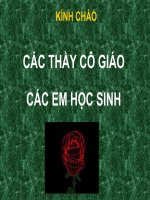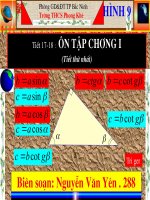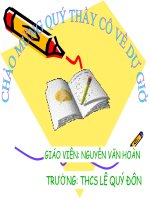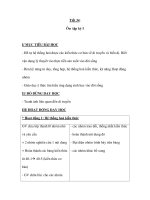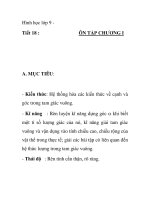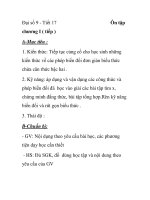ENGLISH 8 WEEK 9 P17 18 ÔN TẬP KTGK I
Bạn đang xem bản rút gọn của tài liệu. Xem và tải ngay bản đầy đủ của tài liệu tại đây (173.78 KB, 10 trang )
<span class='text_page_counter'>(1)</span>Date of preparing: 28/10/2020. Period 17. REVIEW. A. The aims of the lesson 1. Knowledges + The aims: - Further practice with the past simple and the past simple with wish the present perfect with Since, For , Yet , Already . - The present perfect and the past simple and the passive with ordinary verbs and modal verbs. + Vocabulary: Unit 1,2. + Grammar: - The tense: simple present tense, past simple tense. Use the past simple and the past simple with wish well. If only+ clause (past tense/ be: were) - The present perfect with Since, For , Yet , Already , the passive with ordinary verbs and modal verbs. 2. Skills: - Listening, reading, writing . 3. Attitude: - Help ss to have good consciousness in order to do some exercises. B. Preparations 1.Teacher : posters, computer 2. Students: Unit 1,2 C. Methods: - Model-Talk-Practice, individual work, group work - Techniques; Jumbled words, pre-questions, correction D. Procedure: I.Organization: ( 1 minute) - Greeting: Good morning! - Who’s absent today? Class Date of teaching Absent students 9A 9B II.Warm up:( 3 minutes) Jumbled words: ocncert acke folwer ohmeotwn. = = = =. III.New lesson: 38’ Teacher’s activities 1. Past simple tense : -Form: S + V( + ed/ past form of irregular verb)… - Meaning: Đã Practice. concert cake flower hometown. Students’activities -Listen.
<span class='text_page_counter'>(2)</span> Ex: 1. Yesterday, I (go)______ to the restaurant with a client. 2. We (drive) ______ around the parking lot for 20 minutes to find a parking space. 3. When we (arrive) ______ at the restaurant, the place (be) ______ full. 4. The waitress (ask) ______ us if we (have) reservations. 5. I (say), "No, my secretary forgets to make them." 2. The past simple with “wish” - Introduce the conditional sentence type 2 used with Wish : * S + wish + S + past subjunctive - I wish I were taller. - Elicit from ss and give model What tense was used with wish? How is wish used? Use: WISH is used when we want really to be different and exactly opposite of the truth in the present. What is it formed? Form: wish + past subjunctive Practice - ask ss to look at the real situations and rewrite the sentences with wish/ wishes. 1.It is so cold today. - I wish… 2. She doesn’t have a bike - She wishes… 3. I study History badly - I wish… 4.There aren’t any companies in my hometown. - I wish… 5.He can’t swim well. - He wishes… 6. He will go there alone tomorrow - He wishes… 7. Mr. Ha is working hard all day - Mr. Ha wishes… 8. He hasn’t finished all the homework - He wishes…. -Listen -Remind the teacher’s instructions. - T - Whole class Half – half Open pairs Closed pairs.. - T- whole class - Work individually.. - T-WC -Work individually. I wish…… She wishes………...
<span class='text_page_counter'>(3)</span> - Ask ss to compare with partners and give feedback. 3. The Present Perfect: The Present Perfect is used to talk about something which started in the past and continues up to the present .We often use for and since with the present perfect tense. Form: S + have/has + PP For + a period of time Since + a point of time Ex 1 1. There is no more cheese. I (eat)……………. it all, I’m afraid. 2.. The bill isn’t right. They (make) Key: have eaten, have ………….. a mistake. made, has started, have 3. Don’t you want to see this turned, have paid programme? It ………….(start). 4.. It’ll soon get warm in here. I (turn)……….. the heating on.. 5.. ………They (pay)…….. money for your mother? - Review the present perfect with ALREADY & YET, EVER →Elicit from the students: + We use the past simple to talk about definite time. e.g. I went to France last year/ two months ago/ in 1992. + We use the present perfect to talk about indefinite past time. 1. Forms - Công thức (+) S + has/ have + past participle (P2) ... (-) S + hasn't/ haven't + P2 ... (?) Has/ Have + S + P2 ... 2. Ex. Read then rewrite the sentences with just, yet and already 1. John goes out. Five mintues later, the phone rings and the caller says ‘Can I. Key: 1. he’s just gone out 2. I haven’t finished yet 3. I’ve already done it 4. Have you found a place to live yet?.
<span class='text_page_counter'>(4)</span> speak to John” You say: I’m afraid … (go out).. 5. I haven’t dicided yet 6. he’s just come back. 2. You are eating in a restaurant. The waiter thinks you have finished and starts to take your plate away. You say: Wait a minute! … (not/finish) 3. You are going to a hotel tonight. You phone to seserve a table. Later your friend says, ‘Shall I phone to reserve a table’. You say: No, … (do/it). 4. You know that a friend of yours is looking for a place to live. Perhaps he has been successful. Ask her. You say: … ? (find). 5. You are still thinking about where to go for your holiday. A friend asks: “Where are you going fot your holiday?” You say: … (not/decide). 6. Tom went to the bank, but a few mintues ago she returned.Somebody asks, “Is Tom still at the bank? ‘. Ex. Change into passive:. 1. You can't wash this dress. →.................................................... 2. You should open the wine about 4. The Passive: 3 hours before you use it. Review the passive forms of present →.................................................... perfect, simple present, simple past, 3. Members may keep books for 3 and simple future. weeks. - Elicit from students the passive forms →.................................................... of the present perfect, simple present, 5. We shall have to tow (lai, dắt, đưa) the car to the garage. past simple, simple future. →.................................................... 6.They ought to have reported the BE + PAST accident to the police. →.................................................... PARTICIPLE. You say: No, … (come back)..
<span class='text_page_counter'>(5)</span> - Ask students to do the exercise.( Ex book) The passive forms of modal verbs and the verb patterns HAVE TO/ BE GOING TO - Elicit from students the modal verbs, must, can, should, might and the patterns have to/ be going to - form: - modal verbs + be + PP - have to/ be going to + be + PP. Step 3.Production - Give 4 examples using “wish” - Elicit from ss and give the model My father isn’t a good player. -If only my father were a good player If only+ clause (past tense/ be:were) Give an exercise, run through it and ask ss to do 1. My cousin isn’t a singer - If only.............................................. 2. My friend doesn’t live in England - If only........................................ 3. My bike is old - If only.................................................. 4. They can’t pass the examination - If only........................................... - ask ss to compare with partners and give feedback.. 7. You must dry-clean it. →.................................................... ................................................. Key 1 - This dress can't be washed. 2 - The wine should be opened about 3 hours before you use it. 5 - The car shall have to be towed to the garage. 6 - The accident ought to have been reported to the police. 7 - It must be dry-cleaned.. 1. If only my cousin were a singer 2. If only my friend lived in England 3.If only my bike weren’t old 4. If only they could pass the examination. Date of planning: 28/ 10 /2020 MID-TERM TEST A.The aims of the lesson 1. Knowledges + The aims:. Period: 18.
<span class='text_page_counter'>(6)</span> By the end of the lesson, the teacher will check ss’ vocabulary, grammar and knowledges from unit 1 to unit 2 + Vocabulary: review all vocabulary and structures from unit 1 to unit 2 + Grammar: the past simple tenses, the past simple with wish, the present perfect, the passive 2. Skills : Listening, reading, writing skills vocab and grammar 3. Attitude: Educate ss to learn hard and to be truthful B. Preparations 1.Teacher : photo the tests : sheets, computer and speaker. 2. Students: review from unit 1 to unit 2, drafting paper. C.Methods: - Individual work D. Procedure: I. Organization: ( 1 minute) Class Date of teaching Absent students 9A 9B II. Test : - Ask Ss to implement the regulations of the test lesson. - Deliver test papers to Ss A. Listening: (2.5 ps) I. Listen to the public announcement then write true or false : … 1. Here is a special announcement. … 2. She was last seen 12 minutes ago. … 3. She has short dark hair. … 4. She is wearing brown shorts. … 5. She may be carrying a large doll II. Listen and fill in the missing words to complete the passage. Last (6) _____ , Lan invited Mary - a friend from England to her home village in Do Son. The village lies (7) _____ the sea. They stayed in Lan’s uncle’s house. It is a small house on the waterfront. Every morning, they (8) _____ up very early and walked along the shore to breath the fresh air. When the sun was warm enough, they went swimming then they laid down (9) ……. the sand and took a sunbathe. There were a lot of (10) ……… who came there to spend their holidays. 6.. a. fall. b. spring. c. summer. d. winter. 7.. a. near. b. far. c. next. d. in.
<span class='text_page_counter'>(7)</span> 8.. a. gets. b. got. c. woke. d. to get. 9.. a. at. b. on. c. in. d. for. 10.. a. workers. b. students. c. people. d. farmers. B. USE OF ENGLISH (2.5 ps) I. Which underlined part is pronounced differently from the others ? (0.5p) 11. a. how b. town c. power d. slow ………….. 12. a. stopped b. laughed c. walked d. stayed. ................. II. Choose the word that has main stress placed differently from the others: (0.5p) 13. a. casual b. logical c. embroider d. rivalry 14. a. official b. optional c. tropical d. separate III. Choose the best option to complete the following sentences: (0.75p) 15. Mai has lived in Ha Noi (for / in/ since) 3 years. 16. Kuala Lumpur is the (town/ village/ capital) of Malaysia. 17. Today jeans are (famously / popular / traditional) all over the world. IV. Use the correct form of the verbs in the brackets. (0.75p) 18. Keiko … Japanese in Viet Nam two years ago. (teach) 19. We … a lot of beautiful landscapes when we were in Singapore. (visit) 20. My father used … newspapers in the morning. (write) C. Reading: (2,5pts ) I. Read the passage and choose the best answer. Circle A, B, or C. Every year, millions of tourists visit California. California is known for its beautiful scenery, warm climate and excellent food. There are twenty national parks in California. They are visited by over thirty million people every year. Many world-famous museums are located there too. The state is divided into two parts, called Northern California and Southern California. San Francisco is located in Northern California. It is surrounded by water on three sides and is a city with beautiful bay and several bridges. Its streets are always filled.
<span class='text_page_counter'>(8)</span> with tourists. There is an area in south of San Francisco that is famous for its computer industries; it is called Silicon Valley. Los Angeles, Hollywood and Disneyland are found in Southern California. Southern California is known for its desert areas, which are sometimes next to snowcapped mountains. Southern California is one of the few places in the world where you can ski in the morning and surf in the afternoon. 21. What is California known for? A. excellent food B. clothes C. oil 22. How many national parks are there in California? A. 30 B. 12 C. 20 23. The state is divided into…………. parts A. 2 B. 3 C. 4 24. Where is the Silicon Valley? A. north of San Francisco B. south of San Francisco C. west of San Francisco 25. What is your country’s climate? A. tropical climate B. mild climate C. temperate climate 26. Quang Ninh is located in ……………………………..? A. the northeastern part of Vietnam B. the south of Vietnam C. the western of Vietnam II. Fill in the blank with a proper word. name uniforms. secondary subjects. comfortable. Huy is a good student of a (27) … school in Ha Noi. He is in grade 9. He always wears school (28) … on school days. Because they bear their school’s (29) … . But on the weekends, He usually wears casual clothes. He likes sport shoes because they are very (30) … . He is very active so he often plays football in his free time. At school, he loves many subjects. He has studied English for four years. 27. ... 30. .... 28.. .... 29.. D. Writing: (2.5 ps) I. Arrange the words to make the meaning sentences. 31. These/ fit/ shoes/ don’t/ me. 32. I/ usually/ on/ jeans/ the weekend/ wear. 33. Maryam/ me/ to/ invite/ wanted/ to/ Kuala Lumpur.. ....
<span class='text_page_counter'>(9)</span> 34. Maryam/ because/ was/ Ha Noi people/ impressed/ friendly/ were. 35. The ao dai/ the traditional dress/ is/ Vietnamese women/ of. 36. Many Vietnamese/often/ women/ today / prefer /wear/ to/ modern clothing at work. 31…………………………………………………………………………………… …… 32…………………………………………………………………………………… …… 33…………………………………………………………………………………… …… 34…………………………………………………………………………………… …… 35…………………………………………………………………………………… …… 36…………………………………………………………………………………… …… II. Complete the second sentence that has the same meaning to the first one. 37. I don’t have your telephone number. => I wish ………………………………………………………………….. 38. My school is being built. => They …………………………………………………. ………………. ………….. 39. She played video games so much last year, but now she doesn't. => She used to ………………………………………………………………………….. 40. Hoa has typed the letter since 3 p.m. => The letter ……………………………………….......................................................... ……………………………………………………………………………………… …… THE END.
<span class='text_page_counter'>(10)</span>
<span class='text_page_counter'>(11)</span>
